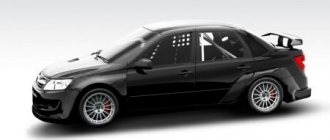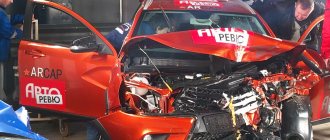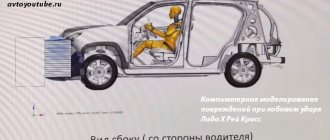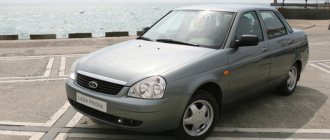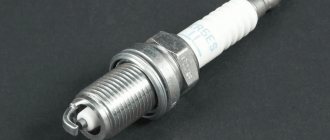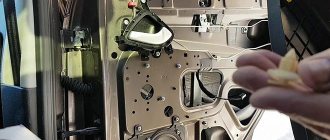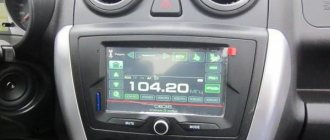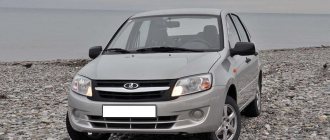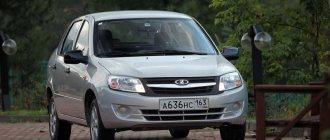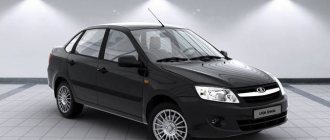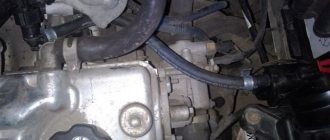This is a new model of a domestic car
Lada Granta is a budget car developed by the Volzhsky Automobile Plant based on the Lada Kalina. Serial production began in May 2011, and sales began in December of the same year. In the AvtoVAZ product line, this car replaced the “classics” and the Samara family. Compared to the compact Kalina, which belongs to class B, the new VAZ model corresponds in size to class C.
The crash test of the Lada Grant was carried out by the Autoreview magazine using the EuroNCAP method. It showed pretty good results, which may not please those who like to scold the Russian auto industry after they see the video of the test.
How the crash test was carried out
Vehicle reliability check
"Autoreview" is a Soviet, then Russian magazine about cars. The publication has been published since 1990. As of September 2014, the circulation was 155 thousand copies. The magazine is published 2 times a month, its volume is from 80 to 160 pages.
Crash testing of European cars is carried out according to the EuroNCAP program, Japanese cars - JNCAP, Australian cars - ANCAP, etc. To avoid duplicating the work of other testers, Autoreview selects cars for testing that have not previously been tested for reliability. Most often these are domestic models assembled at factories in Russia and the CIS countries.
Crash testing is a very expensive pleasure. As a rule, the publication conducts tests at its own expense and anonymously in order to exclude the possibility of a special assembly, that is, the car is bought in a regular retail chain.
The Autoreview crash test involved a frontal impact of a vehicle at a speed of 64 km/h into a deformable barrier made of aluminum honeycombs, which simulates the front end of an average passenger car. The blocks fixed at the bottom are more rigid and imitate a bumper. Since, according to statistics, oncoming collisions rarely occur head-on, during the test the vehicle hits the barrier only with the front end on the driver's side (40% overlap). Such an impact makes it possible to simulate a head-on collision of two cars when they are moving at a speed of about 55 km/h (i.e., the total speed will be 110 km/h).
Inside the vehicle there are 2 Hybrid III dummies strapped in. All parts of the body (head, neck, chest, legs) are stuffed with sensors - there are as many as 34 of them. All sensors in the mannequins are periodically tested. Their accuracy is tested experimentally - by hitting them with a calibrated blank.
Sensors on the mannequins show the impact force on the head, neck, chest, hips, legs of the driver and front passenger. Based on these readings, experts calculate the likelihood of a person being injured in such an accident. The safety of the vehicle is assessed by the movement of the steering wheel, pedals and front left pillar. All tests are carried out in special laboratories of AvtoVAZ and the Dmitrov Automotive Test Site.
Prices for all LADA cars
| Niva Legend 3 doorsOn sale | will appear later |
| Niva Legend 5 doorsOn sale | will appear later |
| Niva TravelOn sale | from 738,000 rub. |
| XRAYOn sale | from 660,900 rub. |
| 4×4Archive | from 587,900 rub. |
| 4×4 5 doorsArchive | from 630,900 rub. |
| 4×4 BrontoArchive | from 742,900 rub. |
| 4×4 UrbanArchive | from 663,900 rub. |
| 4×4 Urban 5 doorsArchive | from 706,900 rub. |
| XRAY CrossOn sale | from 810,900 rub. |
| GrantaOn sale | from 488,900 rub. |
| Granta Drive ActiveOn sale | from 672,900 rub. |
| VestaOn sale | from 676,900 rub. |
| Vesta CrossOn sale | from 823,900 rub. |
| Vesta SportOn sale | from 1,089,900 rub. |
| Granta SportArchive | from 554,900 rub. |
| PrioraArchive | from 424,900 rub. |
| Granta CrossOn sale | from 603,900 rub. |
| Granta Station WagonOn sale | from 515,900 rub. |
| LargusOn sale | from 653,900 rub. |
| Largus CrossOn sale | from 813,900 rub. |
| Vesta SWOn sale | from 759,900 rub. |
| Vesta SW CrossOn sale | from 866,900 rub. |
| Kalina UniversalArchive | from 475,200 rub. |
| Priora UniversalArchive | from 443,000 rub. |
| Largus VanOn Sale | from 640,900 rub. |
| Granta LiftbackOn sale | from 507,900 rub. |
| Granta HatchbackOn sale | from 535,900 rub. |
| KalinaArchive | from 460,600 rub. |
| Kalina CrossArchive | from 545,800 rub. |
| Kalina SportArchive | from 576,900 rub. |
| Priora HatchbackArchive | from 443,000 rub. |
Crash test results Grants
Yellow color - areas of severe injury in an accident
The factory crash test of the Lada Granta was successful. True, the speed of the vehicle was 56 km/h. Then another test was carried out according to European safety requirements (at a speed of 64 km/h). For the test, we chose the Lada Granta sedan of the basic “standard” configuration, which is equipped with an airbag only for the driver.
The interior “cage” withstood the collision and remained intact, and the A-pillar moved back by 72 mm. The result is slightly better than that of Kalina (80 mm), but significantly worse than that of Solaris and Logan (18 and 15 mm). The door frame on the driver's side was severely deformed, and this is penalized with one point. In addition, after the impact, the doors could no longer be opened without special means: the lock drive rods flew off.
But the situation inside the car turned out to be more or less normal. The “stuntmen” sat almost in their places, the steering wheel was not deformed, but moved slightly upward - by 66 mm. It turns out that there is no dangerous sideways movement of the steering mechanism here. During a collision, the driver's head is pushed directly into the center of the deployed airbag, which was confirmed by footage of the recorded video.
The floor does not wrinkle much, and although the clutch and brake pedals have shifted (88 and 125 mm, respectively), they do not pose a threat to the driver’s legs.
The airbag fired 28 milliseconds after impact, and 50 milliseconds later it was fully deployed. There was no breakdown or slipping; the “stuntman’s” head was right in the center of the pillow. The head injury criterion (CHC) was 522 units (green zone - 650 units). There were no problems for the neck either: the criteria were within the “green” zone. But the compression of the mannequin’s ribs turned out to be 2 mm more than expected - 22 mm. Overall: the Takata pillow does its job perfectly, and this despite the fact that the Lada belts have neither force limiters nor pretensioners.
Airbags deploy instantly
The loads on the hips and shins also turned out to be weak - 4.2 kN, while the injury index was 0.52. In the graphic diagrams, the thighs and lower legs could be painted yellow or even green, if not for the broken plastic of the front panel, which can injure the legs of the driver and passenger. In addition, metal elements of the steering mechanism, which are closer than 20 mm from the casing, also increase the risk of injury to the legs. For this, the Lada Granta is penalized by one more point.
Test Methods
The Lada Granta car was designed taking into account modern requirements and standards, including safety standards. All elements responsible for the safety of people's lives have been improved or added. In the basic configuration, the car is equipped with an airbag for the driver, and in the improved configuration - for the front seat passenger.
The official AvtoVAZ video shows a crash test of the Lada Granta in its basic configuration. A mannequin is placed in the driver's seat of a car. The mannequin's parameters correspond to the height and weight of a person and is made taking into account some anatomical features
After watching the video, you will notice that the doll accurately repeats the movements that are characteristic of a living person. Due to this, you can understand what injuries may be sustained as a result of a collision.
Lada was tested according to all accepted standards. In the Autoreview magazine you can find details of tests of various cars. The publication provides information about what speed should be used during crash tests, whether a seat belt should be fastened, and other rules for conducting tests. Autoreview published material about the Lada Granta car and comparing it with other AvtoVAZ products.
Consequences of the accident for the passenger
Now let’s look at what an accident could mean for a passenger. Since he did not have a pillow, only a simple belt, the chest compression was 34 mm, and this is already an “orange” threat level. Passenger CNG – 800 units, somewhere between the “green” and “red” zones (650 and 1000 units, respectively). Although the video showed that the head of the passenger dummy did not touch the front panel, that is, severe damage was avoided, this is still not a very good indicator. After all, CNG evaluates the energy that affects the human brain during an accident. And when a car moves at a speed of 64 km/h and then stops almost instantly, the sensors in the dummy's head show an overload of 60 g or more (even if the head did not hit the front panel or steering wheel). And the critical value is 80 g.
EuroNCAP experts believe that if the load does not reach the peak value of 80 g and there is an airbag in the car, then it seems to “zero out” the danger to the human brain. And if the passenger’s head does not hit the front panel, then such protection is classified by European experts as reliable. Therefore, in the Lada Grant, head protection is considered “green”.
This assessment methodology played a role: in Europe, Japan or America, cars with one airbag have not been produced for a long time. As for Russia, one pillow for Lada is already progress. But, alas, the front seat passenger does not have it.
Side impact
In this case, the situation echoes the one that arose after testing with a frontal impact. The final result varies depending on the assessment criteria.
This time everything happened in the AvtoVAZ passive safety laboratory. For the test we took the Cross station wagon in the top configuration. A side impact involves a collision with a 950 kg trolley equipped with a collapsible barrier at a speed of 50 km/h. The impact itself falls on the center of the car.
All details of the tests are demonstrated in the video.
The side cushion in a car is sewn into the back of the seat. When struck, it opens, blocking part of the window opening, and protects not only the torso, but also the head.
After the cart accelerates on the catapult and hits, after 27 seconds. An ERA-GLONASS operator contacted the car, once again demonstrating efficiency. Like most modern models, the center of gravity of the car is shifted forward, which is why after the impact it was partially turned by its stern. The driver's door glass shattered, while the rear door remained intact, as did the rearview mirror.
After the impact, damage analysis begins, the condition of the interior is assessed, the force required to open the doors is recorded, etc. Only after all this is the condition of the dummy analyzed.
It is worth noting that immediately after the impact, Andrei Matveev, who holds the post of chief engineer of the entire Vesta station wagon project, came onto the site. He said this is the 10th of 12 planned trials and he is pleased with the results. The side airbag inflated at the specified time.
During the development of the project, the designers strengthened the threshold, since the car has increased ground clearance, which means that the impact will fall precisely on the threshold. Therefore, it was necessary to reduce the influence of the threshold on the displacement of the central pillar.
Regarding the likelihood of crash tests of the Lada Vesta Cross station wagon with a full trunk - loaded to the ceiling or with heavy luggage - they are not planned yet. But all the technical solutions aimed at increasing the strength of the seats, implemented in the sedan, are also available in the station wagon.
It would seem that everything went as well as possible - the doors opened easily, the fuel remained in the tank, no serious damage was recorded on the dummy and it was taken out without the use of tools, no dangerous parts got into the cabin, the battery remained intact. All injury criteria are several times lower than acceptable values!
But this is only if we evaluate the crash test and its results according to the “Rule No. 95” standards in force in Russia. These criteria were developed back in the early 80s of the twentieth century, and in 1997 they were adopted by Euro NCAP. However, 2008 and the end of 2015 were marked by serious adjustments to these standards.
First, the EU tightened the evaluation criteria, and later changed the weight of the trolley. AvtoVAZ uses a trolley weighing 950 kg, but there are almost no cars of this weight on the roads anymore, because even the Lada Granta in its basic version weighs over 1000 kg.
Even if we consider the new Euro NCAP criteria with the same trolley weight of 950 kg, the driver’s head is safe, but the ribs and pelvis are already at the limit of the probability of injury - 5% for the ribs and 20% for the pelvis.
But the main thing is that at the beginning of 2022, the weight of the trolley used in Euro NCAP increased from 950 kg to 1300 kg, while maintaining the same evaluation criteria.
EURONCAP rules are stricter
Naturally, with such standards, the crash test result of the Lada Vesta Cross station wagon would not be so impressive, but not a failure, of course.
However, this is not AvtoVAZ’s fault. It's all about the laws passed by the government.
Prices and all configurations of Lada Vesta
Equipment: Classic Comfort Comfort AT Luxe Luxe AT
more details
Test results
So, Lada Granta received 8.4 points and 2 ARCAP stars. At the same time, the driver’s icons are not crossed out, like Kalina’s. In general, the body of the Grant is more or less strong, the seat belts and airbag work normally. It would not hurt to replace the plastic of the front panel so as not to injure your legs from sharp fragments.
An airbag for the passenger, which is available, for example, in the “norm plus” version of the car, will also be very useful. But as numerous videos of crash tests have shown, even the basic “standard” model with one airbag is considered safe. Of course, when compared with Russian cars. Although this is still progress, since many Grant owners will remain safe and sound even after serious accidents.
We recommend reading:
- Characteristics of Lada Granta Lux automatic
- The most important information about the Lada Granta pickup
- Specifications and photos of similar models: Lada Granta station wagon
- We easily and simply do tuning of the Lada Granta
- Parameters and technical characteristics of Lada Granta
- Difficulties in choosing: Renault Logan or Lada Granta
LADA Granta specifications and prices
Select a package to view the basic and additional equipment that is included in it.
- Granta
- Granta Liftback
- Granta Cross
- Granta Station Wagon
- Granta Hatchback
- Granta Drive Active
| Equipment | Body | Engine | Power | Box | Drive unit | Overclocking | Speed | Consumption | Price |
| Standard | gasoline 1.6 l. | 87 hp | M.T. | Front | 11.6 sec. | 172 km/h. | 9.1 | 5.3 | 6.8 | 488 900 | |
| Classic | gasoline 1.6 l. | 87 hp | M.T. | Front | 11.6 sec. | 172 km/h. | 9.1 | 5.3 | 6.8 | 520 500 | |
| Classic Optima | gasoline 1.6 l. | 87 hp | M.T. | Front | 11.6 sec. | 172 km/h. | 9.1 | 5.3 | 6.8 | 546 500 | |
| Comfort | gasoline 1.6 l. | 87 hp | M.T. | Front | 11.6 sec. | 172 km/h. | 9.1 | 5.3 | 6.8 | 568 500 | |
| Comfort | gasoline 1.6 l. | 106 hp | M.T. | Front | 10.5 sec. | 184 km/h. | 8.7 | 5.2 | 6.5 | 583 500 | |
| #CLUB | gasoline 1.6 l. | 87 hp | M.T. | Front | 11.6 sec. | 172 km/h. | 9.1 | 5.3 | 6.8 | 585 900 | |
| Classic Optima | gasoline 1.6 l. | 106 hp | AMT | Front | 12 sec. | 184 km/h. | 8.7 | 5.2 | 6.5 | 586 500 | |
| #CLUB | gasoline 1.6 l. | 106 hp | M.T. | Front | 10.5 sec. | 184 km/h. | 8.7 | 5.2 | 6.5 | 600 900 | |
| Luxe | gasoline 1.6 l. | 87 hp | M.T. | Front | 11.6 sec. | 172 km/h. | 9.1 | 5.3 | 6.8 | 607 800 | |
| Comfort | gasoline 1.6 l. | 106 hp | AMT | Front | 12 sec. | 184 km/h. | 8.7 | 5.2 | 6.5 | 608 500 | |
| Luxe | gasoline 1.6 l. | 106 hp | M.T. | Front | 10.5 sec. | 184 km/h. | 8.7 | 5.2 | 6.5 | 622 800 | |
| Luxe Prestige | gasoline 1.6 l. | 106 hp | M.T. | Front | 10.5 sec. | 184 km/h. | 8.7 | 5.2 | 6.5 | 641 800 | |
| Comfort | gasoline 1.6 l. | 98 hp | AT | Front | 13.1 sec. | 176 km/h. | 9.9 | 6.1 | 7.2 | 643 500 | |
| #CLUB | gasoline 1.6 l. | 98 hp | AT | Front | 13.1 sec. | 176 km/h. | 9.9 | 6.1 | 7.2 | 660 900 | |
| Luxe Prestige | gasoline 1.6 l. | 106 hp | AMT | Front | 12 sec. | 184 km/h. | 8.7 | 5.2 | 6.5 | 666 800 | |
| Luxe | gasoline 1.6 l. | 98 hp | AT | Front | 13.1 sec. | 176 km/h. | 9.9 | 6.1 | 7.2 | 682 800 |
The table contains the following data: name of the configuration, body, its engine (fuel, volume, power). Gearbox (MT - mechanical, AT - automatic, AMT - robotic, CVT - variator). Acceleration from 0 to 100 km/h. Maximum vehicle speed. Fuel consumption per 100 km in liters (in the city | on the highway | in the combined cycle). Manufacturer's recommended price for a new car (may not be current, check with your authorized dealer).
Elements of interior decoration
The next stage of the Lada Liftback test drive was an inspection of the driver’s seat. The seats have become much softer and more comfortable compared to the sedan. The padding material and cut of the chairs were also replaced.
The rear and lower segments of the seats now have leather covering, which makes cleaning the car interior several times easier.
The luggage compartment, as one of the main elements for this model, is upholstered in durable plastic and is also equipped with vertical plastic panels with hooks on which bags or clothes are hung.
However, a test drive of the Granta Liftback showed one untenable detail in the luggage compartment. The tailgate is designed in such a way that the handles responsible for manual closing are located on the inside of the door. This method of closing is quite impractical, since when closing it is necessary to apply force at the beginning of the door's downward movement. From an ergonomic point of view, this detail is a blunder on the part of the designers.
Specifications
Lada granta liftback
Refinement of the sedan allowed the designers to bring the technological components of the Granta to a new level.
Characteristics of Lada Granta Liftback:
- Accelerates from 0 to 100 km/h in just 10 seconds. The maximum travel speed is also at a high level and for the Lada Granta 8-valve engine it is 166 km/h.
- Fuel consumption for a car under normal conditions is 6-7 liters per 100 kilometers.
- On uneven road surfaces or in off-road conditions, it has excellent cross-country ability thanks to updated suspensions.
- Enlarged luggage compartment (from 440 to 760 liters) with a convenient design that allows you to store things comfortably.
Checking the security level
The condition of the car after a head-on collision.
LADA Granta in the liftback version had to pass the crash test twice. The initial stage involved a laboratory experiment in a factory environment, where the passive elements included in the safety system were assessed.
During the 2nd stage, tests were carried out at a Czech test site, the initiative of which was the independent expert publication Autoreview.
The first stage implied mandatory certification. When the car was damaged, all its doors were not blocked as a result of deformation of the panels. The achieved results ensured the transition of the model to the second stage of testing. International standards regulated by the well-known ARCAP doctrine were already involved here. The test involved providing fairly stringent conditions for the test, which can be verified in the video.
As a result of testing, safety indicators did not reach impressive heights, but they were still able to exceed similar parameters for other domestic models. “Autoreview” devoted a lot of material to this event. Let us note that the methods of the two systems are identical: “ARCAP” and “EuroCAP”. The only difference between the first one will be that testing is carried out only in the presence of frontal destructive influences, which is perfectly confirmed by the video.
During the test, the car in the liftback version, equipped with a basic configuration similar to that of the LADA Granta, was able to achieve 8.4 points out of a possible maximum of 16. This fact allowed it to win two stars and stand on a par with such competitors as:
- Hyundai: Accent and Solaris;
- "Chevrolet Lanos";
- Fiat Albea.
Grant was unable to avoid shortcomings in the liftback version during testing, as she received several penalty points. This was due to the risk of injury to the front passenger due to the lack of an airbag on his side (see video).
In addition, upon impact, the body frame lost its structural integrity, and a crack formed on the front panel. This fact also aggravated the final test result, since the likelihood of injury from panel fragments is also quite high.
